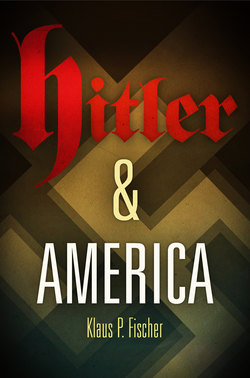Hitler and America

Реклама. ООО «ЛитРес», ИНН: 7719571260.
Оглавление
Klaus P. Fischer. Hitler and America
Отрывок из книги
hitler & AMERICA
Klaus P. Fischer
.....
Who was Colin Ross? Educated, middle-class Germans in the interwar period turned to two world travelers: the pro-German Swedish explorer Sven Hedin, whose writings Hitler had carefully read, and the Austrian-German world traveler Colin Ross. The English name is misleading, for Ross’s first name was probably given to him by his parents because of a remote Scotsman in the family tree. Ross was by training an engineer, but he dabbled in many fields, including history, geography, economics, and philosophy. He received his training from the Technical University of Berlin and Munich and earned a Ph.D. in philosophy from the University of Heidelberg. In 1902 he paid his first visit to the United States as a member of a scientific team representing the German Museum of Natural Science. During this visit he developed a fascination with Chicago, calling it “the wildest and most wicked city in the world—die tollste und übelste Stadt in der Welt.” He later took his family to the city of Al Capone and penned some telling stories that captured the ambience of this gangster-ridden metropolis. That same year Ross went to the Balkans to report for the Münchener Illustrierte. In 1913 he went to Mexico to cover the civil war that radical Mexican factions were waging against each other, reporting to his German readers from Pancho Villa’s headquarters. During World War I, Ross served as a war correspondent, and after the German defeat he embarked on a series of globe-trotting trips that took him—to use the title of one of his books—From Chicago to Chang King.
His visits to America with his family—with kit and caboodle (mit Kind und Kegel), as he called it—stretched over several years and were recounted in his best-selling travel books, notably Amerikas Schicksalsstunde (1935), Die Westliche Hemisphäre (1942), and Unser Amerika (1942). In these “Amerika” books, Ross admitted to a love-hate affair with the United States—but more love than hate. “If I were not a German,” he confessed, “I would want to be an American.”30 He saw in America a dynamic Western idea, a striving toward humanism, freedom, and progress. The pall of depression that hung over America in the 1930s convinced Ross that America’s dynamism had been arrested by two factors: the selfish interest of a small, moneyed elite, and the decline of the Anglo-Saxon ruling class. In his book Unser Amerika (Our America), Ross propounded the popular right-wing view of German nationalists that the strength of America depended on the creativity of the original Anglo-Saxon, Germanic element in America, and that unchecked immigration had “diluted” the better part of the American people. Such views were not original. In 1916 the respected natural scientist Madison Grant had voiced this fear in a book called The Passing of the Great Race, in which he bemoaned the weakening of the genetic pool through intermarriages between the old colonial stock and new immigrants with non-Anglo-Saxon genes. This prejudice was also shared by Hitler, who attributed the entrepreneurial strength of America to the Nordic race and the sound immigration laws the United States had put in place to exclude non-Nordic people. As long as America remained an Anglo-Saxon–Teutonic state, it would continue to be a leader in the Western Hemisphere; but if it pursued multiethnic and multicultural policies, it would disintegrate into a tangle of unassimilated nationalities.
.....